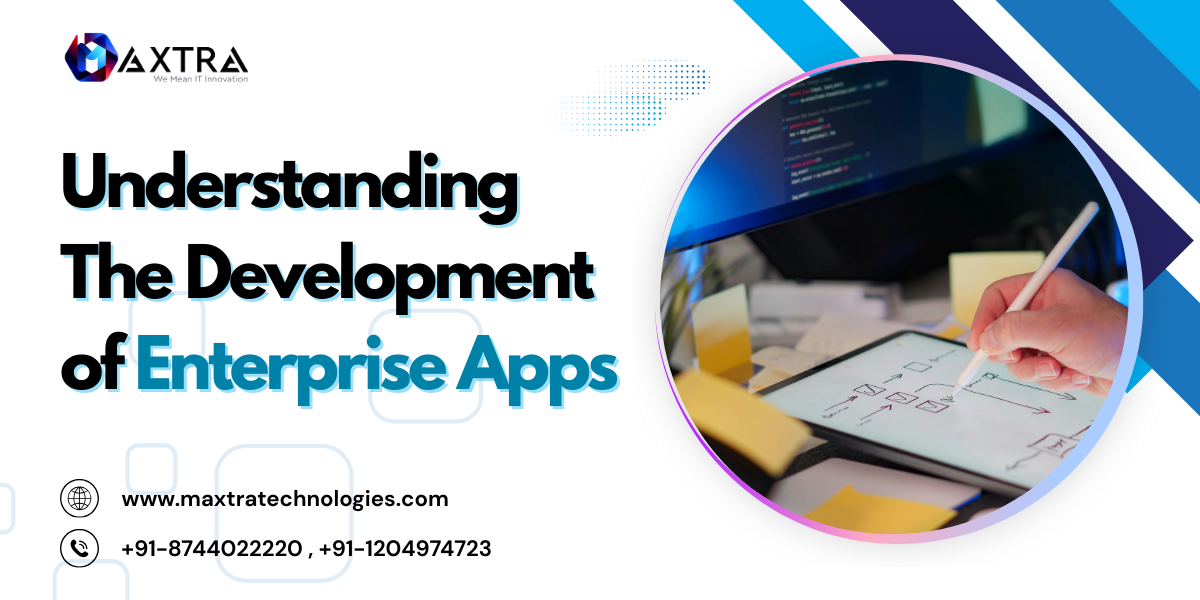
Businesses are rapidly realizing the critical role that software development, particularly mobile applications, play in improving their operations and consumer interaction in the fast-paced digital landscape. To ensure success, choosing the appropriate strategy for enterprise app development is essential.
This extensive manual intends to examine several Enterprise App Development methodologies with a focus on mobile app development. Moreover, this guide will also offer helpful insights into making wise decisions, whether you work for a mobile app development company or are a decision-maker at a business.
Understanding The Development of Enterprise Apps

The development of software solutions tailored to the unique requirements of significant organizations is referred to as enterprise app development.
Moreover, these apps are made to improve internal procedures, collaborate better, increase output, and frequently broaden businesses’ product options.
Due to the widespread use of smartphones and the rising demand for remote access, mobile apps in particular have become of utmost importance.
Take a Look at Challenges with Enterprise App Development
The difficulties that come with developing enterprise apps must be acknowledged before exploring the various development strategies:
- Complexity: Complex procedures and workflows are typical in enterprises, necessitating complex software solutions.
- Scalability: The application must be able to expand with the company without sacrificing quality.
- Security: Businesses manage sensitive data, making strong security measures necessary to protect data.
- Integration: The app must easily work with other programs and systems that are already in use.
- User Experience: Both employee and consumer satisfaction depend on a good user experience.
Selecting The Appropriate Development Method
Enterprise app development can make use of a variety of software development methodologies. Each strategy has advantages and is appropriate for certain situations:
1. Waterfall Method
The sequential development steps of the classic Waterfall approach are requirements gathering, design, implementation, testing, deployment, and maintenance. This approach works best for projects with stable, clearly specified needs since it reduces the likelihood of modifications during development.
2. Agile Methodology
Agile development methods, such as Scrum, emphasize teamwork, adaptability, and iterative progress. They work especially well when requirements change, allowing teams to make frequent adjustments based on user feedback.
However, this strategy encourages adaptability and continual improvement, which are essential for enterprise apps that change over time.
3. DevOps
In order to automate and streamline the deployment and maintenance processes for the app, DevOps places a strong emphasis on collaboration between the development and IT operations teams.
This method supports enterprise programs that need frequent upgrades and patches by ensuring quicker releases and more effective problem solutions.
4. RAD stands for Rapid Application Development
Rapid prototype and quick feedback cycles are the main emphasis of RAD. It is appropriate for businesses that demand quick development and implementation.
For apps that priorities speed to market without compromising quality, RAD is effective.
5. Platforms with Low-Code or No-Code
These platforms make it possible to build applications with little to no human coding. However, they are perfect for businesses with limited resources or those seeking to accelerate development cycles. Moreover, low-code/no-code platforms are valuable for apps with straightforward requirements.
6. Hybrid Method
To meet the unique needs of the organization, a hybrid approach integrates components from different techniques. For instance, a company might implement DevOps concepts for more efficient operations after launch while still using the agile development practices.
Check Out Development of Enterprise Mobile Apps
The creation of enterprise mobile apps demands special consideration given the widespread use of smartphones. When selecting a development strategy, take into account the following:
1. Native Apps
Native apps are developed using platform-specific programming languages (e.g., Swift for iOS, Java/Kotlin for Android) for a given platform (e.g., iOS, Android). They demand different development efforts for each platform yet offer the best performance and accessibility to device features.
2. Cross-Platform Applications
With the help of cross-platform development frameworks (like React Native and Flutter), programmers can design apps that run on several platforms with only one codebase. Despite being effective, they could have trouble accessing some native functionality.
3. Web Apps
Web apps have the benefit of being accessible to everyone because they operate inside web browsers. They might not, however, offer native apps’ performance levels or integration skills.
4. PWAs or Progressive Web Apps
PWAs integrate the finest features of native and online apps. They are web applications that can be downloaded and installed on a user’s device and feature push alerts, offline functionality, and quicker load speeds.
The success, adaptability, and efficiency of a business app are directly impacted by the choice of the best software development approach. When making your decision, take into account the project’s complexity, the need for flexibility, the project’s security needs, and the target platform.
Enterprises must adopt a creative and flexible approach to software development given the rapidly changing nature of the technology world.
Pros of Implementing The Right Software Development Approach For Enterprises
There are several benefits to implementing the proper Enterprise App development methodology for businesses, all of which help the apps that are created be successful and efficient. The following are some major benefits of selecting the ideal software development strategy:
-
Alignment with Business Goals:
Using the appropriate software development methodology guarantees that the applications created are in line with the particular aims and objectives of the company.
The ability of the app to answer important business needs and have a real impact on the operations, effectiveness, and growth of the company is improved by this alignment.
-
Increased Productivity and Efficiency:
A wise development strategy streamlines the procedure, allowing for the quicker and more effective delivery of applications. Employee access to technologies that meet their demands as a result increases overall productivity
-
Shorter Time-to-Market:
Agile and DevOps are two methodologies that place a focus on quick development, testing, and deployment cycles. These approaches let businesses to release their apps more quickly, giving them a competitive advantage by enabling them to react quickly to changing consumer requests and market trends.
-
Flexibility in Adapting to Changing Requirements:
In the fast-paced corporate climate of today, requirements might change quickly. Enterprises may more easily accommodate changes throughout development using agile and iterative methods, ensuring that the finished product is still useful and relevant even as conditions change.
Conclusion:
You can make sure that your corporate app turns into a potent instrument for promoting growth, productivity, and customer pleasure by studying the many ways out there and customizing them to your particular demands.
However, the appropriate strategy can pave the way for amazing success in the digital sphere, regardless of whether you’re a business decision-maker or a member of a Mobile App Development Company.









